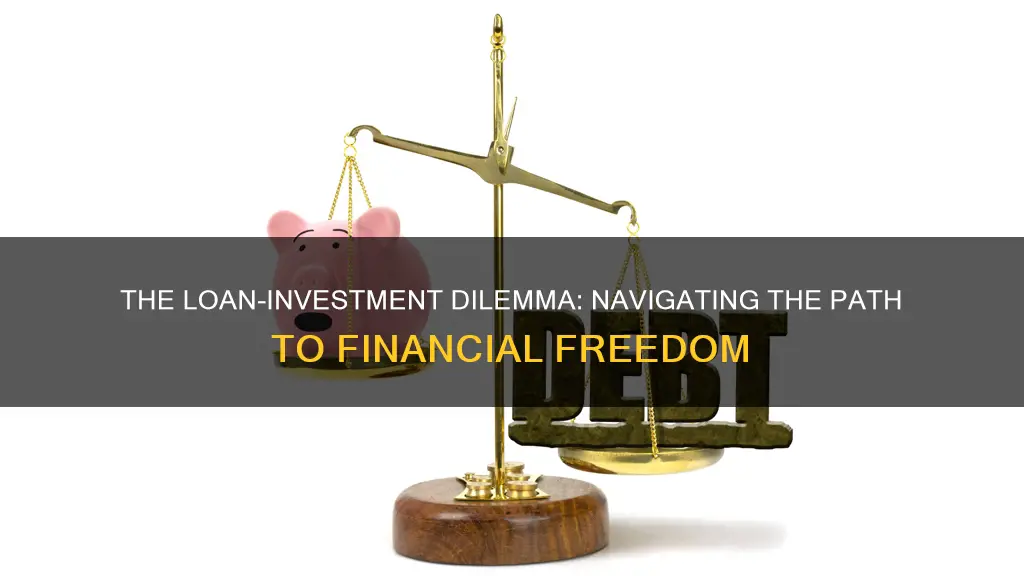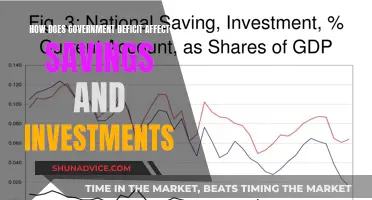
Whether to pay down a loan or invest depends on a variety of factors, including an individual's financial situation, the interest rate on the loan, and how close they are to retirement. Generally, it is recommended to pay off high-interest debt before investing, as it is likely to provide a better return on investment. However, if the interest rate on a loan is lower than the returns on potential investments, then investing may be the better option.
| Characteristics | Values |
|---|---|
| Risk | Paying off a loan is a safer move, but investing can bring higher returns |
| Interest rates | If the interest rate on your loan is high, it may be better to pay it off first |
| Retirement | If you are nearing retirement, paying off your loan may be a better option |
| Savings | If you are paying off your loan with your savings, you may not have enough liquid assets left over for emergencies |
| Peace of mind | Being debt-free can bring peace of mind, but it might not make the most financial sense |
| Opportunity cost | Paying off your loan early means you can't use that money for other financial goals |
| Liquidity | Property is an illiquid asset, so if you need money quickly, you would need to sell your house |
| Tax breaks | Paying off your loan instead of investing in tax-advantaged retirement accounts means you will lose out on tax breaks |
What You'll Learn

The pros and cons of paying off a loan early
Paying off a loan early can be a great idea, but sometimes there are better ways to spend or save your money. Here are some pros and cons to help you decide whether or not to pay off a loan early.
Pros
- Save money on interest: The faster you can pay off a loan, the less it will cost you in interest.
- More money in your monthly budget: You can use the money you save from paying off your loan early for other expenses or financial goals such as building an emergency fund or saving for retirement.
- Lower your debt-to-income ratio: Lowering your debt-to-income ratio may positively impact your credit score and help you qualify for more favourable loan terms and rates in the future.
- Gain peace of mind: Being free of debt can reduce your financial pressure and stress.
Cons
- Prepayment penalties: Some lenders charge a penalty fee for paying off a loan early, which could outweigh the interest saved.
- Impact on your credit score: Paying off a loan early could temporarily lower your credit score as lenders will no longer be receiving consistent on-time payments.
- Better ways to allocate money: If the interest rate on your loan is lower than other types of debt, you may want to focus on paying off the higher-interest debt first.
Stocks to Buy: Top Picks
You may want to see also

The benefits of investing instead
There are several advantages to investing your money instead of paying off your loans. Here are some key benefits to consider:
- Higher returns: Investing in the stock market or other financial instruments can potentially provide higher returns compared to the interest saved by paying off loans early. Historically, the average stock market returns have often exceeded mortgage rates and other loan interest rates.
- Compound interest: Starting to invest early allows your money to grow over time through the power of compound interest. The earlier you begin, the more time your investments have to benefit from compound interest, potentially resulting in a larger nest egg over the long term.
- Tax benefits: Certain types of investments, such as retirement accounts, offer tax advantages. Additionally, the interest on some loans, like student loans and mortgages, may be tax-deductible, making it more advantageous to invest rather than pay off these loans early.
- Liquidity: Investing in stocks, bonds, or other marketable securities provides you with liquid assets that can be easily converted to cash if needed. In contrast, paying off a loan early does not provide the same level of liquidity, as accessing that money would require taking out another loan or selling assets.
- Employer match: If you invest in a retirement account and your employer offers a matching contribution, you can benefit from "free money" and enjoy compound earnings on those contributions over time.
- Peace of mind: While paying off loans can provide peace of mind by reducing debt, investing can also offer a sense of financial security and confidence, especially if you are investing for the long term and can weather the ups and downs of the market.
- Financial flexibility: Investing allows you to pursue multiple financial goals simultaneously. By investing instead of paying off loans early, you can maintain financial flexibility and work towards a diverse range of financial objectives.
Remember, the decision to invest instead of paying off loans depends on various factors, including interest rates, investment opportunities, risk tolerance, and personal financial goals. It is always a good idea to consult with a financial professional to help you make informed decisions that align with your specific circumstances.
Wealthy Secrets: Where the Rich Invest
You may want to see also

How to decide between the two
There is no one-size-fits-all answer to the question of whether to pay down a loan or invest. The best option depends on several factors, including your financial situation, the interest rate on the loan, and your risk tolerance. Here are some things to consider when deciding between paying down a loan and investing:
- Financial situation: If you have high-interest debt, such as credit card debt, it is generally a good idea to make paying it off a priority. Credit card debt often comes with high interest rates, which can make it difficult to pay off. By tackling it first, you can save money on interest and free up cash for your emergency fund or investments.
- Interest rates: Compare the interest rate on your loan to the potential returns on your investments. If you can earn a higher return on your investments than the interest rate on your loan, investing may be the better option. On the other hand, if your loan has a high-interest rate, paying it off early can save you a significant amount of money in the long run.
- Risk tolerance: Investing in the stock market or other investments comes with risk. The value of your investments can go up or down, and there is always the possibility of losing money. If you are comfortable with taking on risk and have a long investment horizon, investing may be a good option. On the other hand, paying down a loan is a more predictable and safer option.
- Peace of mind: Being debt-free can provide peace of mind and reduce stress. If the weight of debt keeps you awake at night, there is nothing wrong with paying it off sooner. You can’t put a price on your peace of mind.
- Opportunity cost: Consider the opportunity cost of paying off your loan early versus investing. If you pay off your loan early, you may be giving up the potential for higher returns on your investments. On the other hand, investing instead of paying off your loan may increase your debt and the amount of interest you pay over time.
- Liquidity: Investments like stocks and bonds are liquid, meaning you can easily convert them into cash if needed. On the other hand, property is an illiquid asset, and accessing the wealth tied up in your home can be difficult and time-consuming.
Ultimately, the decision to pay down a loan or invest depends on your individual circumstances and financial goals. It is essential to consider your budget, create an emergency fund, and understand your risk tolerance before making a decision. Consulting a financial advisor can also help you make an informed choice that aligns with your goals and risk tolerance.
Paying Down Debt vs. Investing: Where Should Your Money Go?
You may want to see also

The importance of emergency funds
Emergency funds are an essential part of financial planning. They are a safety net, providing financial stability and peace of mind.
An emergency fund is a dedicated savings account for unexpected expenses or financial emergencies. These can include medical bills, home or car repairs, travel costs, or a loss of income. Without an emergency fund, you may be forced to rely on credit cards or loans, which can lead to a cycle of debt that is difficult to escape. It is a common occurrence that can be avoided with proper planning.
The recommended amount to save in your emergency fund is enough to cover three to six months' worth of living expenses. This will help you weather income shocks, such as losing your job, and spending shocks, like a medical emergency. You can calculate this amount by determining your monthly expenses and multiplying that number by three, five, or six. It is also recommended to have a smaller emergency fund of at least $1,000 to $2,000 for minor emergencies.
It is important to keep your emergency fund in a safe, accessible place, such as a savings account with a high-interest rate and easy access. A high-yield savings account is a good option as it is federally insured and earns interest. You could also consider cash investments, money market funds, or a cash management account. Keeping your emergency fund separate from your daily bank account will help you avoid the temptation of dipping into it for non-emergencies.
Building an emergency fund can be done in several ways. You can set up automatic recurring transfers from your checking account to your savings account, so you save consistently without having to think about it. You can also take advantage of one-time opportunities to save, such as tax refunds or cash gifts, and put that money towards your emergency fund. Additionally, you can ask your employer to split your paycheck between your checking and savings accounts, so you save effortlessly.
In summary, an emergency fund is a crucial part of financial planning. It provides security and peace of mind, allowing you to handle unexpected expenses without going into debt. By saving consistently and choosing the right savings account, you can ensure that you have the funds you need when unexpected events arise.
Mortgage Freedom or Investment Gains: Where Should Your Money Go?
You may want to see also

The impact of interest rates
Interest rates have a significant impact on whether you should pay down your loan or invest. They affect borrowing costs, investment returns, and savings earnings.
Borrowing Costs
When interest rates are high, the cost of borrowing money through loans, credit cards, or mortgages increases. This results in higher monthly payments and more interest paid over the life of the loan. For example, when interest rates rise, it becomes more expensive for companies to borrow money, leading to reduced cash flow stability and pressure on share prices.
Investment Returns
Changes in interest rates can significantly impact different types of investments. When borrowing rates increase, financial institutions can offer more competitive interest rates on savings accounts. Rising interest rates also make the yield on Guaranteed Investment Certificates (GICs) more attractive.
On the other hand, when interest rates rise, stock markets tend to decline as spending decreases. This can lead to reduced productivity, layoffs, and lower earnings for companies, causing stock prices to fall.
Bonds and bond funds are also affected by interest rate changes. Bond prices and interest rates typically move in opposite directions. When interest rates rise, the market value of bonds usually decreases, and vice versa.
Earnings on Savings
Higher interest rates can benefit your savings accounts and other interest-bearing accounts by increasing the earnings on your savings, helping your money grow faster.
Key Considerations
When deciding whether to pay down a loan or invest, it is crucial to consider the interest rate on your debt and the expected return on your investments. If the interest rate on your debt is higher than the expected return on your investments, it is generally advisable to prioritize paying down the debt.
Additionally, it is important to have a financial buffer for emergencies, be up to date with minimum payments, and be free of high-interest credit card debt before deciding between paying off debt and investing.
Smart Ways to Invest $1,000
You may want to see also
Frequently asked questions
Paying off your loan can reduce your stress and increase your peace of mind. It can also help you build equity, and save you thousands in interest payments.
Investing can help you grow your wealth and generate higher returns than the interest on your loan. It also provides liquidity, which means you can easily access your money if needed.
You should consider your financial situation, the interest rate on your loan, how much extra cash you have, your risk tolerance, and how close you are to retirement.
By paying off your loan early, you may be forgoing higher returns that could be earned by investing your money elsewhere.
Yes, mortgage interest is often tax-deductible, which can reduce your taxable income. However, if you invest in certain tax-advantaged retirement accounts, you may also receive tax benefits. Consult a tax professional for guidance.







